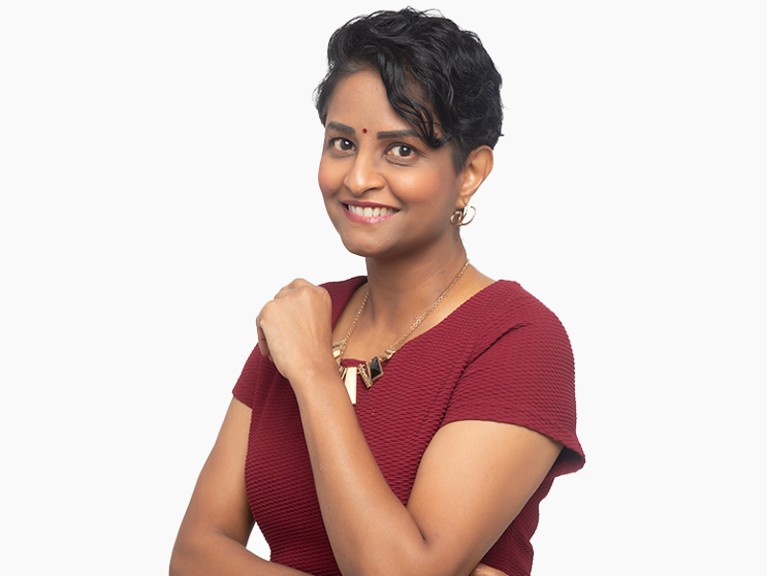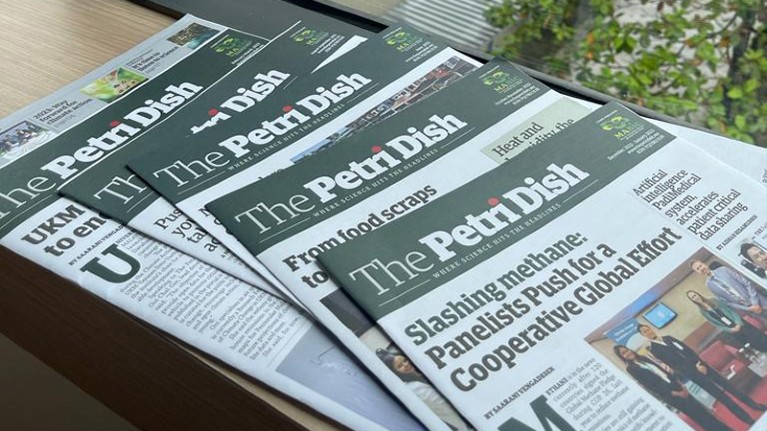
Mahaletchumy Arujanan wants to make science more accessible to the general public.Credit: Mahaletchumy Arujanan
In 2008, Mahaletchumy Arujanan graduated with a PhD in science communication from the University of Malaya in Kuala Lumpur. She was the first person in her country to get such a degree. Three years later, as executive director of the Malaysian Biotechnology Information Centre (MABIC), a non-profit organization dedicated to public engagement in biotechnology, she launched The Petri Dish, the country’s first scientific newspaper aimed at the general public. Here she describes how this came about.
Tell us how The Petri Dish was developed
After graduating with a master’s degree in biotechnology from the University of Malaya in 1997, I worked in various biotech-related roles. I realized then that getting a scientific discovery, or a product, to consumers or end users requires a lot more than just the science — there’s communication, policy, marketing, ethics and even religion involved.
For example, in 2009, Muslim clerics in the Philippines considered issuing a religious decree saying that genetically modified organisms are haram — forbidden by Islamic law. I thought about the possible repercussions if neighbouring countries with a large Muslim population followed suit.
At the time, I had been at MABIC for six years, and as part of my role there as executive director I organized a dialogue between scientists and ulamas — scholars of Islam who are knowledgeable in Islamic teachings, scriptures, doctrine and law. I wanted to find common ground and help both parties to understand each other’s perspectives.
The first event I organized did not succeed, but a second attempt, a year later, was successful. The resolutions of the workshop stated that products from genetically modified organisms are halal (or allowed) as long as the sources from which they originate are halal — a much more permissive position.
In that period, I started connecting the dots. Scientists publish mainly in journals, but politicians and policymakers don’t often read such articles. I also found that the mainstream media usually has no empathy and passion for science, and I wanted a media resource that understood science and researchers better.
I decided to set up such a media outlet myself. I started by finding an editor, getting buy-in from MABIC board members, designing a business plan and seeking a source of funding.
That was how the idea of The Petri Dish was born. It is a physical newspaper written in English, with some pages in Tamil, that you can read on the train, but it is also published online. To my knowledge, it is the only scientific newspaper in Malaysia.
Who reads it?
We distribute 20,000 copies of each issue in Malaysian states where English is the main language. It is available in shopping centres, private hospitals, coffee shops, hotels, airports, public universities, the parliament and in ministries related to science. It is published every other month.
Print copies of The Petri Dish are free, but on our website, some content is behind a paywall. Production costs are covered by advertising, and individual and institutional subscriptions that enable access to all the online content.

The Petri Dish is a Malaysian newspaper in English, with some articles in Tamil, and is published every other month.Credit: Saarani Vengadesen
We have two full-time staff members and a part-time editor, plus interns, who are really passionate about what we do. Students seek us out because we are known at their universities and lecturers call us to ask for a placement for them, or people find out about me through social media. I truly appreciate the interest of young graduates in our activities.
What content do you cover and how do you source it?
Like many mainstream media companies worldwide, we get sent to press releases and are invited conferences, people pitch their ideas to us, or we ask for permission to republish stories originally published elsewhere. The Petri Dish started with a focus on bioscience and agricultural technology — in line with MABIC’s remit — but we are now looking to expand to all fields of research. Currently, we have funding from a US non-profit organization, the Environmental Defense Fund, to talk about climate-change mitigation, so there will be more content on that topic.
Is there any story that you are particularly proud of?
I especially like thought-provoking issues and seeing things through a different lens. For example, we published a story in October on how a ‘brain drain’, resulting from researchers migrating to other nations, could nevertheless help to develop other scientists’ careers in the country of origin. I am also proud to cover local biotech companies and scientists, because that puts Malaysia on the global map. We’ve covered everything from mushroom scientists to criminologists.
What have been the biggest challenges so far?
Funding is the main one. I always ask myself: will I be able to sustain this in six months’ time? We are always looking for funding, especially because it takes a long time to secure it: sometimes we talk to potential funders for a year and the money comes through only one year after that.
Another challenge, for a newspaper, is getting the writing style right. People who are formally educated in science are not usually trained in writing in an engaging manner, for example by using hooks for their research to interest the public, and this means training the writers who work for us.
Why do you think The Petri Dish is important?
I see it as helping to prevent scientific misinformation. For example, if there is too much risk attached to a specific research topic, it won’t be invested in. But if we help to explain the science, we could be a part of reducing that perceived risk.
Overall, it’s really worth it. In Malaysia, our literacy level is nearly 100%, but it sometimes feels as if the public doesn’t get basic science facts. We need to work on scientific literacy now — and I’m excited about that.
What are your other roles?
Alongside my roles as executive director of MABIC and editor-in-chief at The Petri Dish, I am the global coordinator of the International Service for the Acquisition of Agri-biotech Applications, a non-profit organization that pioneers knowledge transfer and focuses on agribiotech research in low-income countries.
I’m also an adjunct professor at Monash University Malaysia in Bandar Sunway.
How do you balance it all?
I’m really lucky to be surrounded by great colleagues, and I believe in letting them work independently and empowering them to make decisions. More generally, I try not to procrastinate — if I’m asked to give a talk one month from now, for example, I’ll start working on it immediately, so that when the time comes I already have a very good head start.
Flexible hours also help me; even before the pandemic, I worked from home. I’m definitely something of a workaholic, but I enjoy every bit of my work — passion really helps me to do it all.

 Training: Conducting and troubleshooting in data analysis
Training: Conducting and troubleshooting in data analysis
 Collection: Science communication
Collection: Science communication
 How I switched from academia to science communication
How I switched from academia to science communication
 What scientists can expect when dabbling in science writing
What scientists can expect when dabbling in science writing
 ChatGPT use shows that the grant-application system is broken
ChatGPT use shows that the grant-application system is broken




